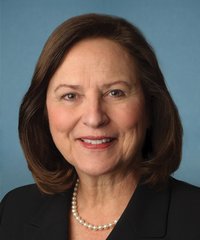
A lifelong Nebraskan, Deb Fischer is the senior senator from Nebraska. In November 2012, Fischer was first elected to the U.S. Senate becoming the first Nebraska woman elected to a full term and the first Nebraska state senator elected directly after service in the state legislature. Six years later, in November 2018, Nebraskans overwhelmingly voted to send her back to the U.S. Senate for a second term.
Fischer is committed to working with Republicans and Democrats alike to advance sensible policies that will promote strong Nebraska families and communities.
Chaired EPW Field Hearing in Columbus, NE, on the EPA’s Proposed Ozone Rule: Senator Fischer Brought the Senate Environment and Public Works Committee (EPW) to Columbus, Nebraska, for a hearing entitled “Impacts of the Environmental Protection Agency’s Proposed Ozone Standard on Manufacturing and Utilities.” The hearing explored the impact of the EPA’s proposed rule to lower the ozone standard for manufacturing and public power utilities. Fischer heard testimony from a variety of Nebraska stakeholders, including representatives from the manufacturing industry, public power utilities, and small-business community.
Cosponsored legislation to stop the EPA’s takeover of the our electric system: Senator Fischer joined her colleagues in introducing the Affordable Reliable Energy Now Act - legislation that will halt the damaging effects of the Obama administration’s proposed regulations to control new and existing power plants. It also protects ratepayers from increased electricity rates and reduced reliability.
The first provision allows states to provide their own certification regarding the appropriate level of environmental review of certain projects, rather than wasting time waiting for the federal government to provide the assessments.
The second provision establishes procedures – based on a template developed by the Transportation Secretary – allowing states, in addition to the federal government, to determine which state or federal agencies (U.S. Fish and Wildlife Service, Historical Society, etc.) must be consulted prior to beginning an infrastructure project.